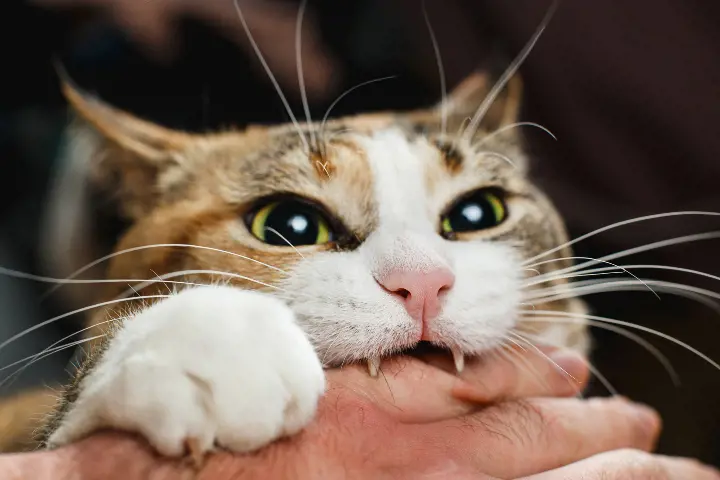What to do if a cat bites you?
31st October, 2023

A cat bite might seem like a minor incident, but the reality is that these seemingly harmless wounds can sometimes lead to serious health issues. This article will provide you with a comprehensive guide on what to do if a cat bites you, whether you're based in the UK, the US, or anywhere else in the world.
Why are cat bites potentially dangerous?
The first thing you need to understand is why cat bites can be potentially hazardous. Despite their small size, cat bites can cause a deep puncture wound which can lead to infection.
The sharp, needle-like teeth of a cat can thrust bacteria deep into the skin, leading to rapid multiplication and potential infection.
The hidden threat in a feline's mouth
Cats' mouths house various types of bacteria that can easily cause serious infections if they enter the human body through a bite.
One of the most common bacteria is Pasteurella multocida, which is highly pathogenic. If the bite wound becomes infected, it may appear red, swollen, and cause significant discomfort.
The risk of cellulitis and septicemia
If left untreated, the bacteria from a cat bite can spread to surrounding tissues, leading to a condition known as cellulitis.
In severe cases, bacteria can enter the bloodstream and spread to other parts of the body, causing a condition known as septicemia, often referred to as blood poisoning.
Immediate action to take after a cat bite
If you find yourself on the receiving end of a cat bite, there are several immediate steps you should take to minimise the risk of infection or complications.
Step 1: Clean the wound
The first thing you should do is to wash the wound under running water for at least five minutes. You can clean the wound gently with a mild soap solution or a mild salt solution.
However, you should avoid scrubbing the wound vigorously or using strong disinfectants, as these can potentially harm the tissue and delay wound healing.
Step 2: Control the bleeding
After cleaning the wound, you should try to control any bleeding by applying pressure to the wound using an absorbent dressing or bandage.
Step 3: Seek medical help
Even if the wound seems minor, it's crucial to seek medical help as soon as possible. Most cat bite wounds are small punctures that can lodge bacteria deep into the skin.
If left untreated, a serious infection can develop because of the wound within 24 to 48 hours.
Why you should always see a doctor after a cat bite
You might wonder, "Do I really need to see a doctor for a cat bite?" The answer is a resounding yes.
The importance of proper medical treatment
A doctor can properly assess and treat the injury, ensuring that the wound is thoroughly cleaned and any necessary antibiotics are prescribed. They can also determine if the wound is better left open to heal or if it needs to be sutured.
Rabies and tetanus considerations
Depending on the severity of the bite and the circumstances surrounding it, your doctor may also recommend that you receive a rabies prophylaxis treatment.
If it's been more than five years since your last tetanus vaccine, a booster may be advised.
What happens to the cat that bites you?
In many regions, the medical examiner may be required to file a report with the local health department after a cat bite.
If the cat's rabies vaccination status is known and up-to-date, the cat will typically be placed under a short quarantine, ranging from 10 to 14 days. If the cat's rabies vaccination has lapsed, the quarantine may last longer.
Preventing cat bites
Preventing cat bites is equally important as knowing what to do if a cat bites you. Here are some key strategies:
Choosing the right pet
Choose your family pet cautiously and make sure their vaccinations are kept current.
Supervising young children
Never leave a young child alone with a pet. Young children may not know how to handle pets gently, which can provoke the pet and lead to a bite.
Avoiding unfamiliar or sick animals
Avoid contact with unfamiliar animals or animals that are sick, especially if they have unknown vaccination records.
Leashing your pets in public
To prevent unexpected situations that might lead to a bite, it's best to keep your pets on a leash when in public.
How long after a cat bites does infection set in?
A cat's sharp fangs can do more harm than just a simple puncture wound. Cat bites often lead to developing severe infections if not treated promptly. But how long after a cat bite does infection set in?
Well, it might surprise you to know that signs of infection can appear as rapidly as within 24 hours of the bite. The wound may become red, swollen, and painful, or pus may start to drain.
If you experience these symptoms or if the wound doesn't start to heal within a couple of days, you should seek medical attention immediately.
What should I do if my family pet bites someone?

If your family pet bites someone, it's crucial to seek immediate medical attention for the person bitten.
Depending on the severity of the bite, you may need to report the incident to local authorities.
What are the signs or symptoms of rabies?
Signs or symptoms of rabies in cats can include behavioural changes, aggression, excessive drooling, difficulty swallowing, and paralysis.
When should I get authorities involved?
You should get authorities involved if the cat that bit you or someone else is a stray, shows signs of rabies, or if the bite results in severe wounds.
Additional resources
For more information about animal bites, you can refer to the following resources:
National Institutes of Health, MedlinePlus: Animal Bites
World Health Organization: Animal Bites
Protecting your furry friend with cat insurance
Caring for your cat involves taking precautions to ensure their health and wellbeing, and this includes having a good cat insurance policy.
Cat insurance can cover costs related to accidents and illnesses.. To get a cat insurance quote for your furry friend, you can get a quote through our website.
If you would like to speak to one of our cat insurance team members, feel free to get in touch with us on 0330 102 5748.
Conclusion
While a cat bite might seem minor, it's crucial to take it seriously due to the risk of infection and potential complications. Always seek medical attention if a cat bites you, and take steps to prevent bites from occurring in the first place.
Remember, your pet's health and safety are your responsibility, and understanding what to do if a cat bites you is an essential part of being a responsible cat owner.
Helpful Pages
Recent Posts

Why do Great Danes bury their heads?
12/03/25
Find out more about Beagles
28/02/25Pet Insurance Quote
- 98% claims paid *
- Claims paid directly to vets
- 24/7 vet video consultations
- Interest free monthly payments


